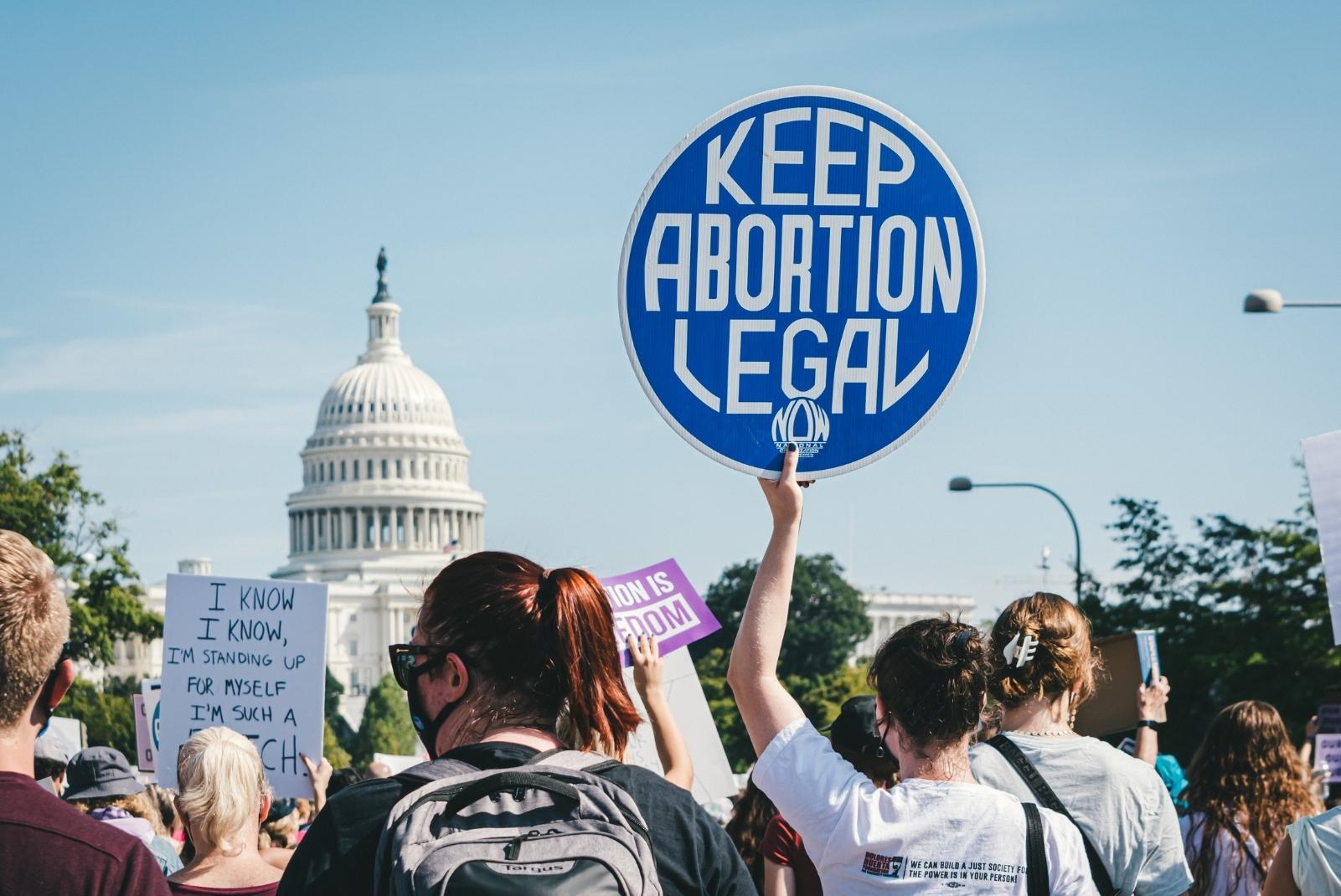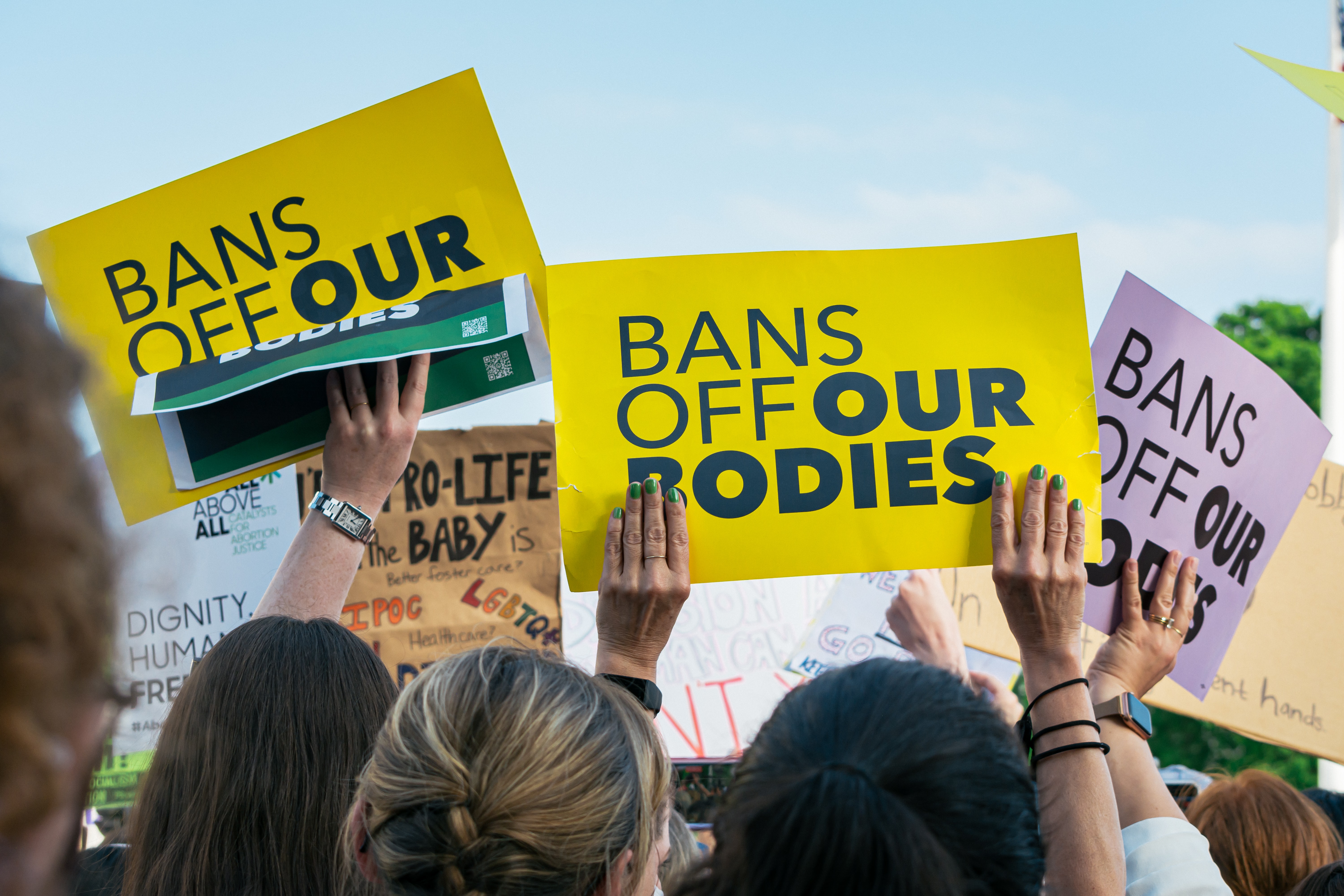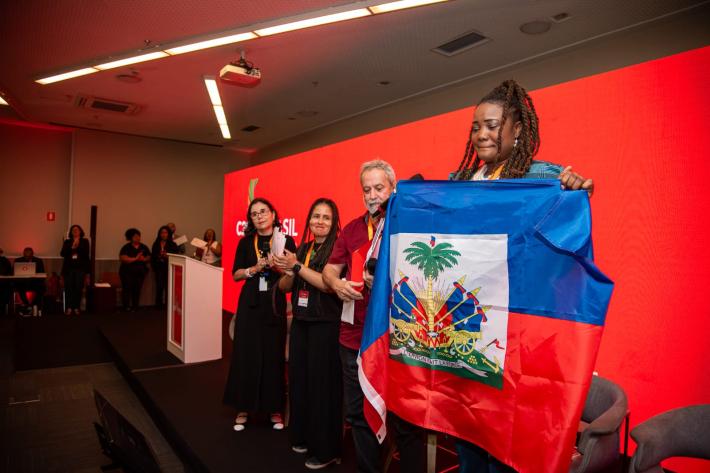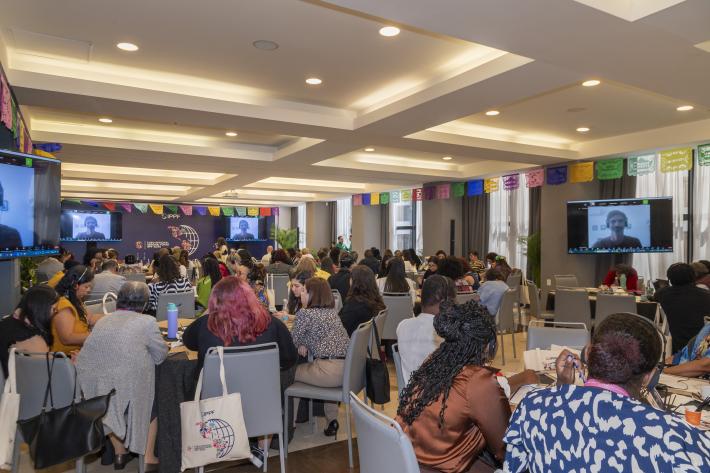Latest press releases
A selection of stories from across the Federation
Americas & the Caribbean
Breaking: IPPF Global Research Exposes Devastating Impact of the Trump Administration
Over Half of Partners and $85 Million Affected
For media enquiries


| 06 November 2024
The Fight for Reproductive Rights Continues
The Fight for Reproductive Rights Continues Today, we recognize the steadfast advocates for people’s rights, particularly reproductive rights, who showed up to vote in the U.S. elections, exercising their power to affirm bodily autonomy and defend freedom. In Arizona, Colorado, Maryland, Missouri, Montana, Nevada, and New York, voters upheld reproductive freedom. Their votes are a testament to an enduring commitment to safeguarding reproductive rights and personal agency over one's body, life, and future. We also commend the tremendous work of the Planned Parenthood Federation of America, our dedicated Member Association in the U.S., whose tireless campaigning has highlighted what was at stake in this pivotal election. Their unwavering advocacy has empowered countless individuals to protect and advance our shared values. We know this is a moment to be concerned. The outcome of this election deals a heavy blow to the Sexual and Reproductive Rights Movement. IPPF anticipates significant setbacks, including funding reductions and workforce cuts impacting SRHR defenders globally. This election result is devastating for the millions who will rely on sexual and reproductive health care over the coming years and beyond. But it is exactly because of this that we need to be stronger than ever: many more people will need us. Therefore, let’s assure the world that IPPF Member Associations and Collaborative Partners across the Americas and the Caribbean remain resolute in our mission to ensure comprehensive sexual and reproductive health and rights for all. Let there be no doubt: we will continue the fight for our right to make autonomous decisions about our reproductive lives, to live our sexuality freely, and to access inclusive health services that meet the diverse needs of our communities, whether in contraception, fertility, transgender care, HIV prevention and care, or beyond. And we will continue to strengthen our alliances with progressive social movements around the region and the globe. In this critical moment, we call on all governments, donors, and international agencies to step up in the face of the upcoming assaults on human rights that will come with the Trump administration, because activists, communities, and civil society organizations are on the frontlines but should not fight these battles alone. This is an election that particularly affects the Latin American and Caribbean region. We are part of the Green Wave, and we won’t give up. Therefore, it is time to intensify efforts and demand fully funded social movements, including sustained funding for our SRHR champions and their unwavering efforts to counter the ongoing attacks on rights in the field. Now more than ever, it is imperative to support those defending bodily autonomy and freedom, ensuring they have the resources and backing required to resist, persist, and advance the rights of all people. We will not be deterred. Our commitment to the millions of people we assist and support, communities, and allies stands firm. Together, we will continue to resist and build a world where everyone can live free from violence and fully exercise their right to shape their present and future. Image credit: BBC

| 16 October 2023
IPPF ACRO express concern over guidance of the Zambian Ministry of Health who advised against the use of the term “sexual and reproductive health and rights”.
At a time of profound and multiple crises, it is worrying that the focus of any government's action is to go back on already consolidated international commitments, particularly those which recognize, based on evidence, that Sexual and reproductive health and rights (SRHR) are fundamental human rights, central to eradicating poverty and achieving sustainable development across its social, economic, and environmental dimensions. SRHR – which encompasses a range of issues, including universal access to SRH services and supplies, comprehensive sexuality education, and ending gender-based violence and harmful practices such as early, child and forced marriage – are fundamental to the ability of all people, especially women, adolescent girls and young people, to lead full, satisfying, healthy and productive lives. SRH services are a critical aspect of SRHR, but a complete understanding of sexual and reproductive health and rights goes far beyond on access to health facilities and services to include an array of social, legal, institutional, and financial arrangements that enable individuals to exercise their rights in general and addresses the underlying social determinants. In this regard, our Latin American community urges the government of Zambia to review its position and, on the contrary, to improve and expand the SRHR services, including increasing funding in this sector, for example by investing in fulfilling the human rights of women and girls, in all their diversity, as gender discrimination is one of the leading determinants of poor health and unwanted SRHR outcomes. It is also key to addressing inequities in access due to poverty and multiple forms of discrimination, stigma and social and economic exclusion affecting various population groups. We conclude by highlighting the importance of evidence-based policies and, in 2023, the data indicates that effective policies are not those based on stigma and discrimination or elimination of rights. On the contrary, effective policies are those that include, care for, and treat all people as subjects of rights, capable of making decisions about their health and reproductive life, with the support of a State committed to promoting citizenship and the human dignity of their people. Here, at IPPF ACRO, we will remain attentive and always willing to contribute so that rights do not go backwards and no one is left behind. In solidarity, Eugenia Lopez Uribe Regional Director for the Americas and the Caribbean

| 24 June 2022
US Supreme Court overturns Roe v Wade in devastating blow to women's health and rights
The US Supreme Court has overturned Roe v. Wade in the biggest blow to women's health and rights in recent US history, removing 50 years of constitutional protection for abortion across America, meaning individual states will now decide the legality of abortion within their jurisdiction. Twenty-six states, including Mississippi, Oklahoma, Texas and Georgia, are now poised to enact "trigger laws" that will severely limit or ban abortion, putting approximately 40 million women and girls of reproductive age at risk of losing abortion access, with lower-income people and people of color most severely affected. The patchwork of state abortion bans means those without funds to travel for safe and legal abortion services or access medical abortion pills will be forced underground to unsafe and unregulated methods, with no guarantee of quality of care or aftercare if things go wrong. The devastating rollback of reproductive rights resulted from the Dobbs v. Jackson Women's Health Organization case, a 2018 ruling that banned abortion in Mississippi after 15 weeks of pregnancy. Of the nine federal Supreme Court Justices, six voted to uphold the Mississippi law, effectively overturning Roe v. Wade, and three dissented. Dr Alvaro Bermejo, Director-General of the International Planned Parenthood Federation, said: "The Supreme Court's decision to overturn Roe v. Wade is the biggest blow to women's health and rights in recent US history and an outrageous and devastating conclusion to what was already an unconstitutional removal of life-saving healthcare. "By continuing its unbridled attack on women's bodies and forcing them to carry pregnancies to term, the highest court in the land has reached its lowest point, robbing millions of their liberty, bodily autonomy and freedom – the very values the United States prides itself on. "We know for a fact that banning abortion does not mean fewer abortions and that when abortion bans are enacted, women and pregnant people die, as we have seen across the globe, most recently in Poland. We also know that those who cannot access safe abortion care legally, including medical abortion pills, will be forced into unregulated and unsafe methods, potentially resulting in serious harm or even death and costing lives for decades to come. "The fallout from this calculated decision will also reverberate worldwide, emboldening other anti-abortion, anti-woman and anti-gender movements and impacting other reproductive freedoms. The justices who put their personal beliefs ahead of American will, precedent and law will soon have blood on their hands, and we are devastated for the millions of people who will suffer from this cruel judgment." The overturning of Roe v. Wade also flies in the face of democracy and against the values of those the Supreme Court is meant to represent and protect, with the majority (60%) of Americans supporting Roe v. Wade and 70% believing the decision to end a pregnancy is between a woman or pregnant person and their doctor. Elizabeth Schlachter, Director of Advocacy and US representative for the International Planned Parenthood Federation, said: "The Supreme Court's perilous ruling is not just regressive but also wildly out of step with most Americans, who we know support access to abortion care. It is also at odds with much of the world, where access to abortion is expanding to reach all who need this vital health service. "By overriding the constitutional right to abortion across the US and handing the decision to each state, many parts of the US will now join El Salvador, Nicaragua, and Poland with some of the most restrictive, extremist, and life-threatening bans on abortion care in the world. "But this is not just about the anti-abortion movement in the US; this is concerted and calculated global effort by anti-women, anti-gender, anti-LGBTQI+ conservative and religious, white supremacist extremists, who are using dark money and undemocratic means to deny people their human right to healthcare, equality, bodily autonomy and ultimately, freedom. "With long-held rights under sustained attack, the International Planned Parenthood Federation is imploring governments across the globe to do more to protect democracy and peoples' freedoms from the interference and influence of these extremist groups." The International Planned Parenthood Federation's (IPPF) Member Association, the Planned Parenthood Federation of America (PPFA), continues to provide services to all who need them where legally possible, including via telemedicine for medical abortion pills. IPPF and PPFA will also continue to work around the clock to protect the rights of all people both in the US and globally, fighting extremism at its core and ensuring that women and pregnant people will not be forced to carry a pregnancy or give birth against their will. To help keep abortion legal, safe, and accessible, you can donate to the International Planned Parenthood Federation or Planned Parenthood Federation of America. For media enquiries, please contact Karmen Ivey on [email protected] or [email protected] About the International Planned Parenthood Federation The International Planned Parenthood Federation (IPPF) is a global service provider and advocate of sexual and reproductive health and rights for all. For over 65 years, IPPF, through its 118 Member Associations and 15 partners, has delivered high-quality sexual and reproductive healthcare and helped advance sexual rights, especially for people with intersectional and diverse needs that are currently unmet. Our Member Associations and partners are independent organizations that are locally owned, which means the support and care they provide is informed by local expertise and context. We advocate for a world where people are provided with the information they need to make informed decisions about their sexual health and bodies. We stand up and fight for sexual and reproductive rights against those who seek to deny people their human right to bodily autonomy and freedom. We deliver care rooted in rights, respect, and dignity - no matter what.

| 25 February 2022
Statement on the escalating conflict in Ukraine
Following the disturbing reports coming out of Ukraine, IPPF has released a media statement on behalf of the Federation and its Member Association in Ukraine. Despite the fact that sexual and reproductive healthcare (SRHR) needs increase significantly during conflict and humanitarian situations, the significant vulnerabilities of affected populations and displaced people are often overlooked, especially the experiences of women, girls and marginalized populations who are at increased risk of unintended pregnancy, sexually transmitted infections and sexual and gender-based violence. IPPF’s Director-General, Dr Alvaro Bermejo, said: "The International Planned Parenthood Federation (IPPF) is deeply concerned about the escalation of conflict in Ukraine. We take our responsibility to preserve the enormous gains made in life-saving sexual and reproductive healthcare across the country very seriously, especially for women, girls and marginalised populations, whose vulnerability and experiences are so often overlooked in humanitarian situations. "For 20 years, IPPF has consistently worked to strengthen and protect the reproductive rights of people in Ukraine, working in the frontline conflict zones of Lugansk and Donetsk since 2014, training medical specialists to provide life-saving reproductive healthcare, psychosocial support and quality care to survivors of sexual and gender-based violence. “Our teams are now contingency planning across the region to address not only the needs of those still in Ukraine, but also the millions who are likely to be displaced by the conflict and who will require critical support to continue accessing healthcare. We will work closely with partners and other NGOs to ensure the least possible disruption to services. "IPPF stands in solidarity with the international community and the brave people of Ukraine who for the last eight years have faced terrifying and difficult circumstances that nobody should ever have to suffer through. We stand by IPPF's frontline team, who, despite the dangers, continue to facilitate life-saving healthcare for those who need it most. We will be monitoring the situation closely to ensure the safety of our colleagues across the region.” For European outlets, please contact [email protected] For UK and other international media outlets, please contact Karmen Ivey on [email protected] or [email protected]
















